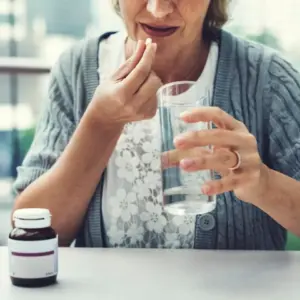Understanding Inflammatory Bowel Disease Causes and Treatment
Learn about inflammatory bowel disease, its causes, symptoms, diagnosis, and effective treatment for long-term relief.

Inflammatory Bowel Disease
Inflammatory Bowel Disease (IBD) is a chronic condition that causes inflammation of the digestive tract, leading to discomfort, diarrhea, and other digestive issues. The two main types of IBD are Crohn’s Disease (which can affect any part of the digestive tract) and Ulcerative Colitis (which affects the colon and rectum).
At VS Hospitals, patients receive world-class care for IBD through a multidisciplinary team of gastroenterologists, dietitians, and surgeons. Using advanced diagnostic tools, personalized treatment plans, and global protocols, the hospital focuses on controlling inflammation, relieving symptoms, and improving long-term quality of life.

Early Detection Saves Lives
Early detection and treatment are crucial for improving the chances of survival. If you notice any concerning symptoms, consult a healthcare provider immediately.
Signs and Symptoms
Chronic diarrhea
Often mixed with mucus or blood.
Abdominal pain and cramping
Especially in the lower or middle abdomen.
Unintended weight loss
Due to poor absorption of nutrients.
Fatigue and weakness
Resulting from inflammation and nutritional deficiency.
Blood in stool
A sign of intestinal bleeding or ulceration.
Fever and night sweats
During flare-ups of inflammation.
Loss of appetite
Caused by nausea, pain, and bowel irregularities.
Joint pain or skin rashes
Associated with systemic inflammation in severe cases.
Blood in Urine
Hematuria - pink, red, or dark urine, the most common symptom
Frequent Urination
Feeling the need to urinate frequently, even when bladder is not full
Painful Urination
Experiencing pain or burning sensation while urinating
Back or Pelvic Pain
Pain that occurs as the cancer grows and spreads
Unexplained Weight Loss
Significant weight loss not related to diet or exercise
Fatigue
Feeling unusually tired or weak without a clear cause
Patients with prolonged digestive symptoms should consult VS Hospitals immediately for comprehensive evaluation and early management.
Meet Our Expert Inflammatory Bowel Disease Treatment Specialists
Risk Factors
Smoking
Smoking is one of the leading causes of bladder cancer. Chemicals in tobacco smoke can damage the lining of the bladder, increasing the risk.

Gender
Men are at a higher risk of developing bladder cancer than women.

Chronic Bladder Infections or Inflammation
Conditions such as bladder infections and long-term bladder inflammation can increase the risk.

Exposure to Chemicals
Prolonged exposure to certain chemicals, especially those used in the dye industry, rubber production, and chemical manufacturing, increases the risk.

Genetic predisposition
Family history of IBD significantly increases risk.

Overactive immune response
The immune system mistakenly attacks the intestinal lining.

Smoking
Increases risk and severity, particularly in Crohn’s disease.

Dietary habits
High-fat, low-fiber diets and processed foods can worsen inflammation.

Environmental factors
Urban living and exposure to pollutants or infections.

Long-term stress
May trigger flare-ups or worsen symptoms.

Age group
Commonly affects individuals between 15–40 years but can occur at any age.

Medication use
Overuse of NSAIDs (painkillers) can irritate the bowel lining.

Inflammatory Bowel Disease
Diet and Nutrition
Prevention
Diagnosis
Key Services
Key Facilities
Proper nutrition plays a crucial role in controlling inflammation and preventing flare-ups. The dietitians at VS Hospitals provide customized nutritional plans to maintain gut health and minimize discomfort.
- High-Protein Foods: Include lean meats, eggs, and fish to repair tissue and reduce fatigue.
- Low-Fiber Diet During Flare-Ups: Avoid raw vegetables, nuts, and seeds that may irritate the bowel.
- Stay Hydrated: Frequent diarrhea can cause dehydration; drink plenty of water and oral rehydration fluids.
- Avoid Dairy if Lactose Intolerant: Helps prevent bloating and cramping.
- Limit Caffeine and Alcohol: Both irritate the digestive tract and worsen diarrhea.
- Include Probiotics: Yogurt and fermented foods promote healthy gut bacteria.
- Opt for Small, Frequent Meals: Reduces stress on the digestive system.
- Iron and Vitamin Supplements: Replace nutrients lost due to poor absorption.
- Avoid Spicy or Fried Foods: These can trigger inflammation and acid reflux.
- Include Omega-3 Fatty Acids: Found in flaxseed and fish oil, known for anti-inflammatory properties.
At VS Hospitals, diet management is an essential part of IBD treatment, focusing on both symptom control and long-term intestinal health.
Although IBD cannot always be prevented, its flare-ups and complications can be minimized through lifestyle management and medical monitoring. The Gastroenterology team at VS Hospitals focuses on preventive care through education and follow-ups.
- Quit Smoking: Reduces disease progression and complications.
- Eat Balanced Meals: Maintain a diet rich in vegetables, fruits, and whole grains during remission.
- Stress Management: Practice meditation, yoga, or therapy for emotional well-being.
- Stay Hydrated: Keeps intestinal tissues healthy and reduces inflammation.
- Regular Exercise: Improves blood flow, digestion, and immunity.
- Routine Medical Check-Ups: Regular colonoscopy and blood tests help monitor inflammation.
- Avoid Self-Medication: Improper antibiotic or painkiller use can aggravate IBD.
- Monitor Symptoms: Early detection of bleeding, fatigue, or changes in stool consistency allows timely medical attention.
- Vaccination: Protects against infections that can worsen inflammation.
- Follow Doctor’s Advice Strictly: Consistent medication adherence is key for disease control.
The preventive model at VS Hospitals ensures that patients learn how to manage their lifestyle and prevent severe relapses through continuous medical supervision.
Accurate diagnosis is essential to distinguish IBD from other digestive conditions such as irritable bowel syndrome (IBS) or infections. VS Hospitals uses advanced diagnostic tools and laboratory technologies for precise evaluation.
- Comprehensive Blood Tests: Measure inflammation markers like CRP and ESR, detect anemia, and rule out infections or immune-related disorders.
- Detailed Stool Analysis: Identifies hidden blood, bacteria, and calprotectin levels to differentiate IBD from infectious gastroenteritis.
- Colonoscopy with Biopsy: Directly visualizes the colon to detect ulcers, bleeding, and narrowing while collecting tissue samples for confirmation.
- Upper GI & Capsule Endoscopy: Examines the upper digestive tract and small intestine, with capsule endoscopy reaching areas beyond standard scopes.
- Advanced Imaging Scans: CT and MRI enterography offer detailed visualization of intestinal inflammation, abscesses, or fistulas for accurate assessment.
- AI-Assisted Diagnostic Review: Expert gastroenterologists utilize digital imaging and AI-supported analysis to ensure precise results and rapid reporting.
At VS Hospitals, all diagnostic results are reviewed by expert gastroenterologists who use digital imaging systems and AI-assisted analysis for greater accuracy and faster reporting.
VS Hospitals provides an integrated approach to treating IBD — focusing not just on symptom relief, but on preventing complications and improving long-term digestive health.
- Comprehensive Medical Management: Tailored use of aminosalicylates, corticosteroids, immunosuppressants, and biologic therapies to control inflammation and manage flare-ups effectively.
- Personalized Nutritional Therapy: Expert dietitians create customized meal plans, recommend supplements, and provide guidance on hydration, fiber, and food elimination for gut healing.
- Minimally Invasive Surgical Care: Advanced laparoscopic and robotic procedures like bowel resection, strictureplasty, or colectomy ensure faster recovery and less post-operative pain.
- Psychological & Emotional Support: Counseling and support groups help patients manage stress, maintain treatment adherence, and improve overall well-being.
- Pediatric & Geriatric IBD Management: Specialized medical and nutritional care is provided for children and elderly patients to address their unique health needs.
- Long-Term Monitoring & Prevention: Regular follow-ups, colonoscopy surveillance, and disease progression tracking ensure early detection of complications and sustained remission.
VS Hospitals is among Chennai’s most advanced centers for gastroenterology and IBD management, equipped with next-generation technology and comprehensive support systems.
- Advanced Endoscopy Suite: High-definition scopes for colonoscopy, sigmoidoscopy, and capsule endoscopy.
- Robotic and Laparoscopic Surgery Units: Enable precision procedures with minimal recovery time.
- Modern Diagnostic Laboratory: Real-time testing for inflammatory and autoimmune markers.
- Radiology and Imaging Center: Includes CT, MRI, and ultrasound for detailed GI tract visualization.
- Inpatient and ICU Facilities: Dedicated gastroenterology wards for critical and recovery care.
- 24/7 Emergency Department: Immediate treatment for acute bleeding or obstruction.
- Dietary and Nutritional Support: In-house experts design balanced, gut-friendly meal plans.
- Rehabilitation and Counseling Center: Focuses on post-treatment recovery and mental health support.
- Infection-Controlled Environment: Ensures safe and sterile procedures.
With its blend of advanced medical technology and compassionate patient care, VS Hospitals offers the best possible environment for diagnosing and managing Inflammatory Bowel Disease effectively.
Top Medical Facilities at Our Multispeciality Hospital – Here’s What Makes Us Different!
Ready to Begin Your Inflammatory Bowel Disease Care Journey?
Learn More About Inflammatory Bowel Disease Care
Frequently Asked Questions
IBD results from an overactive immune response that attacks the digestive tract, causing inflammation. Factors like genetics, diet, smoking, and infections may trigger it. VS Hospitals provides expert evaluation to identify the underlying cause and deliver personalized medical and nutritional therapies for long-term symptom control.
Treatment depends on the severity and type—Crohn’s disease or ulcerative colitis. VS Hospitals offers anti-inflammatory medications, biologic therapy, and minimally invasive surgeries. The team also includes dietitians and psychologists to provide holistic care that reduces flare-ups and improves the patient’s quality of life.
While there is no permanent cure, IBD can be effectively controlled through medication, diet, and lifestyle changes. At VS Hospitals, long-term management plans help patients achieve remission, reduce inflammation, and prevent complications. With proper treatment, most individuals lead healthy, productive lives without frequent flare-ups.
